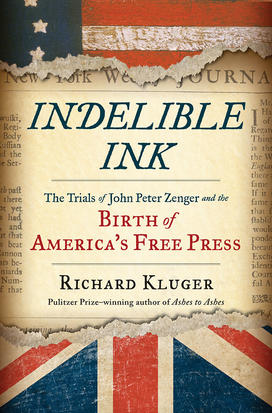Lots of Americans remember that John Peter Zenger had something to do with freedom of the press, but beyond that, Zenger’s story is largely unknown. So Pulitzer Prize-winning author Richard Kluger ’56 decided to write a book about him. The result — Indelible Ink: The Trials of John Peter Zenger and the Birth of America’s Free Press — was published in September.

The newspaper was “not high art,” Kluger said, and often trafficked in satiric political allegories. “For its day, it was a sensation,” he said. Beyond pressing ink to paper, Zenger had nothing to do with the editorial jeremiads. But he became the newspaper’s public face — and the target of a counterattack by the governor and his allies. Zenger spent nearly a year in jail before facing a one-day trial in August 1735.
“There was almost no chance that he would win, but he did,” Kluger says. “And that was the beginning of press freedom in America and the world.” The case, skillfully argued by his lawyer, set today’s precedent that public accusations of wrongdoing cannot be considered libelous if they are true.
Kluger cites working for The Daily Princetonian during an era that featured journalistic giants-in-training like R.W. (Johnny) Apple ’57 and Robert Caro ’57 as a formative experience of his life.
The theme of social justice in Zenger’s story fits with many of Kluger’s previous books, whose topics include the Brown v. Board of Education Supreme Court decision; the rise and fall of tobacco; a bloody battle between Native Americans and white settlers in the 1850s; and the history of one of his former employers, the New York Herald Tribune.
“I was astonished that there had never been a full narrative about Zenger,” Kluger said. A big part of that, he explained, had to do with the lack of surviving documentation. Kluger had only two significant pieces of direct evidence to work with — scanned copies of Zenger’s newspaper and handwritten notes taken at the trial by Zenger’s lawyer.
Kluger fills out the book with research into the history of free expression during the reign of British monarchs — and found a shocking level of contempt for it. “You could be thrown into jail for criticizing the government, no matter if it was true or not,” he said. “In fact, [the truth] was in some ways a worse crime, because the truer it was, the more likely it was to upset the status quo.”
But thanks to Zenger, press freedom became “the key element in the democratic form of government. If there’s no free press, there’s no informed electorate.”
“Print has declined markedly with the rise of the internet, but there are so many more outlets for free expression,” Kluger said, noting continued strong protections against libel suits. He added: “I think American press freedom is more solid than ever.”












No responses yet